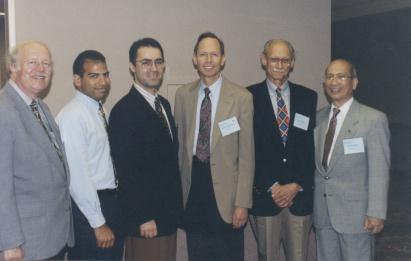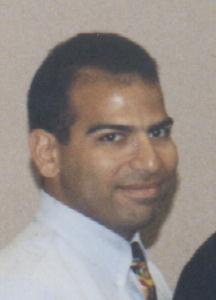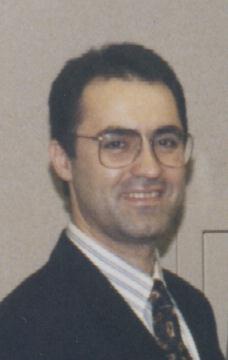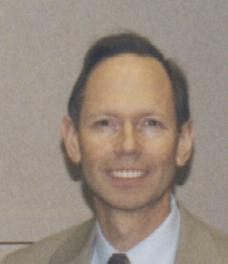 The Richard E. Bellman Control Heritage Award
The Richard E. Bellman Control Heritage Award
 The Richard E. Bellman Control Heritage Award
The Richard E. Bellman Control Heritage AwardThe award is given for distinguished career contributions to the theory or applications of automatic control. The Bellman Control Heritage Award is the highest recognition of professional achievement for U.S. control systems engineers and scientists. Richard E. Bellman, for whom the award is named, was an applied mathematician who pioneered the development of system theory as an academic discipline in the 1950s and 1960s. His accomplishments are described in IEEE Transactions on Automatic Control, 1984. The Bellman Award is unique among the AACC awards in that it is made for lifetime contributions to control and systems engineering. Such contributions may cover a range of technical areas or may have been put into practice in several different fields. The winner of the Bellman Award usually has been involved with the interaction of control or system theory with other scientific disciplines, with the engineering profession, and/or with the implications of controls for society at large.
Awarded to Elmer G. Gilbert for a distinguished career in automatic control, with pioneering research contributions to a broad range of subjects including linear multivariable systems theory, computation of optimal controls, nonlinear systems theory, and motion planning in the presence of obstacles.

Elmer G. Gilbert is Emeritus Professor of Aerospace Engineering and Electrical Engineering and Computer Science at the University of Michigan. He obtained the B.S. and M.S. degrees in Electrical Engineering and the Ph.D. in Instrumentation Engineering, all from the University of Michigan. In 1957 he joined the Department of Aerospace Engineering and later was given a joint appointment in the Department of Electrical Engineering and Computer Science. He has held visiting positions at the United States Air Force Seiler Research Laboratory (1965), the Johns Hopkins University (1974-76 and 1991-92) and the University of Minnesota (1985-86).
During the 1950's and 1960's Dr. Gilbert was active in the development and application of analog and hybrid computers. He was granted eight patents on various computer devices and was a co-founder of Applied Dynamics Incorporated (now Applied Dynamics International).
Dr. Gilbert's interests in control have been distinctive and diverse. He is perhaps best known for the 1963 paper on linear multivariable system theory and the 1969 paper on decoupling by state feedback. Both helped to point the way to large bodies of subsequent research. Other areas in which he has made innovative contributions include: computation of optimal controls, periodic optimal control, feedback control of systems with pointwise-in-time constraints, nonlinear systems theory, motion planning in the presence of obstacles.
Dr. Gilbert is a fellow of the IEEE, a fellow of the American Association for the Advancement of Science, a member of the National Academy of Engineering and a member of the Johns Hopkins Society of Scholars. His awards include: the O. H. Schuck Award for the best paper at the 1978 Joint Automatic Control Conference, Research Excellence and Distinguished Faculty Achievement Awards from the University of Michigan and the 1994 IEEE Control Systems Award.
 The Donald P. Eckman Award
The Donald P. Eckman AwardThe Donald P. Eckman Award was the first award established by the American Automatic Control Council. It was established in memory of Donald P. Eckman, who made important contributions to control theory and practice in the 1950s and 1960s but died tragically in an automobile accident in 1962. The purpose of this award is to recognize, particularly, important contributions to the control field made by younger researchers. The age limit for the award was originally set at 30 years, but was later extended to 35 years of age (at the time of the award) as the control field grew and matured, in recognition of the difficulty of making leading edge contributions to a more mature field. While the Eckman Award is given for key contributions made prior to the age of 35, the recipient is normally expected to be the type of individual who will remain a leader in the controls profession; he is an example to be emulated by engineers entering the profession.
The Eckman award is often given for key contributions to a single field of research, based on the discovery of a new phenomenon or design method or scientific principle. In practice, the award has usually been given to individuals who make theoretical contributions which have practical implications. However, the development of devices (e.g., as reflected by patents), or significant contributions to engineering practice, might also be recognized.
Awarded to Jeff S. Shamma for contributions in gain-scheduled control design, robust control for linear parameter varying and nonlinear systems, and nonlinear design for linear systems.

Jeff S. Shamma received the Ph.D. degree in 1988 from the Massachusetts Institute of Technology, Department of Mechanical Engineering. After one year of postdoctoral research at MIT, he joined the University of Minnesota, Minneapolis, where he was an Assistant Professor of Electrical Engineering from 1989 to 1992. He then joined the University of Texas, Austin, where he is currently an Associate Professor of Aerospace Engineering and Engineering Mechanics. He is a recipient of a 1992 NSF Young Investigator Award and a 1995 Departmental Excellence in Engineering Teaching Award. His research interests include gain-scheduled control design, robust control for linear parameter varying and nonlinear systems, and nonlinear design for linear systems.
 The O. Hugo Schuck Best Paper Award
The O. Hugo Schuck Best Paper AwardThe Best Paper Award is given for the best paper presented at the previous year's American Control Conference. In 1987 it was named after O. Hugo Schuck, a pioneer in the practice of flight control design at Honeywell, Inc., and later at NASA. This award was established with the purpose not only of recognizing technical contributions, but also the manner and effectiveness with which they are communicated to the community at the American Control Conference. There are no restrictions on the number, age, or affiliation of authors.
The main source of nominations for the Best Paper Award is submissions by attendees at the conference, who are provided with nomination forms at the registration desk to be used for the following year's conference. Nominations from other sources, following the conference, are also acceptable. Selection criteria include quality of the written and oral presentation, technical contribution, timeliness, and practicality.
Awarded to Miroslav Krstic for his paper "Asymptotic Properties of Adaptive Nonlinear Stabilizer".

Miroslav Krstic is Assistant Professor in the Department of Mechanical Engineering and the Institute of Systems Research at the University of Maryland. He received a BSEE from the University of Belgrade, Yugoslavia, and a Ph.D. from the University of California, Santa Barbara, under Petar Kokotovic, in 1994. He received Best Student Paper Awards at the 1993 CDC and the 1995 ACC, and the 1995 Best Dissertation Award at UC Santa Barbara. He is a recipient of an NSF Career award for 1996. Krstic is a co-author of the book Nonlinear and Adaptive Control Design (Wiley, 1995) with I. Kanellakopoulos and P. Kokotovic. He is an Associate Editor for the International Journal of Adaptive Control and Signal Processing. His research interests include nonlinear, adaptive, and robust control, with applications to propulsion, flight control, and automotive systems.
 The AACC Education Award
The AACC Education AwardThe AACC Education Award is given for outstanding contributions to Control Education in any form. These contributions can be from any source and in any media, i.e., electronic, publications, courses, etc. Due to the large number of well qualified nominees, this award is often one of the most difficult to assign.
In evaluating a nominee for the Education Award, it is common for the Award Committee to seek evidence beyond what is provided in the nomination, such as searching the Citation Index, or considering the leadership positions assumed by graduate students, or evaluating key research results of former graduate students. Education is viewed as a process which extends beyond the classroom or the advising functions of a particular faculty member. The Education Award has normally gone to university professors, but there is no formal requirement that nominees must be university professors. Accomplishments of former students may be considered in making the award.
Awarded to David M. Auslander for pioneering work in integration of real-time control systems into control engineering curricula and for original and significant contributions in simulation languages for control education.

David M. Auslander is Professor of Mechanical Engineering at the University of California at Berkeley. He has interests in dynamic systems and control. His research and teaching interests include mechatronics and real time software, bioengineering, and mechanical control. Current projects in these areas are nanometer mechanical positioning, design methodology for real time control software for mechanical systems, control of long-term, fully regenerative life-support systems and engineering curriculum development. He consults in industrial servo control systems and other control and computer applications. He is co-founder and senior technical consultant to Berkeley Process control, Inc., a company specializing in industrial machine control. His undergraduate studies were at the Cooper Union and his graduate studies were at MIT, both in Mechanical Engineering. He has been awarded the Levy Medal (best paper) from the Franklin Institute (twice), and the Education Award of t!
he Dynamic Systems and Control Division of ASME. He has a longstanding association with the Dynamic Systems and Control Division of ASME including service as its chair and as the editor of the Journal of Dynamic Systems, Measurement and Control.
 AACC Home Page
AACC Home PageJuly 18, 1996aacc.ece.nwu.edu